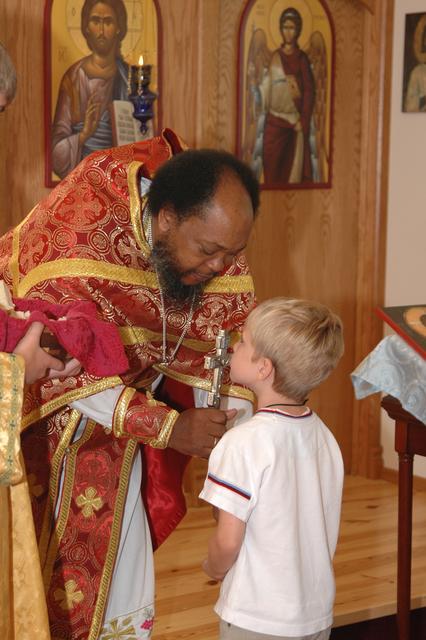An Orthodox friend sends word of a catechumen in his parish, coming to Orthodoxy from Catholicism. My friend is pleased about this, as am I — but I told my friend that as a former Catholic, I have absolutely no feelings of triumphalism about this news. Why? Because I can easily imagine the pain that catechumen may be going through right now, having gone through it myself several years ago.
Relative newcomers to this blog may wish to read my conversion story. It’s long, and was written in a single emotional session at the keyboard, then posted; there are things I would have said differently, and several grammatical errors. Still, I stand by it, because it’s a true account of how I came to leave Catholicism for Orthodoxy. In terms of comments (over 500), it was the most popular post ever on my old Crunchy Con blog. I re-read it last night for the first time in years, and I was struck by how raw my emotions were. I was also reminded of how strange and guilty I felt on the day I was received into Orthodoxy. Strange, because I couldn’t believe I was no longer Catholic, when Catholicism had formed the core of my identify for 13 years, and guilty, not so much because I felt like a traitor to Catholicism (because there was some of that), but because I couldn’t express the joy that other Orthodox converts do on their chrismation day, and, in turn, because I was afraid of hurting the feelings of my new Orthodox friends by not expressing joy. I worried they would think I was sorry to be Orthodox because I wasn’t over the moon with joy.
The feeling I had on the morning I was received into Orthodoxy was the kind of quiet joy one might well feel when, after having been shipwrecked, and drifting on the currents in shark-infested waters, clinging to splinters and boards, one washes ashore on a verdant island — safe at last, but still traumatized by the loss. This is not the kind of conversion story we like to hear. When I was a Catholic, I loved, I mean really loved, reading conversion stories like those in the “Surprised By Truth” series. I especially appreciated the sense converts to Catholicism had of stepping into an undiscovered country, full of delights one hadn’t imagined existed. That’s what it was like for me to become a Catholic. Meaning no disrespect to my Protestant roots, when I entered the Catholic Church, it was like the world shifted from black and white to Technicolor 3D. It’s hard to explain this to a Catholic or a Protestant who hasn’t experienced the shift, but the Catholic theological and devotional world was, to me, far more intricate and textured. Please understand that I’m not trying to express a value judgment here, but rather to describe the experience of the imaginative world of Catholicism. After entering that world, and absorbing it into my bones, when I’d go back into Protestant churches (or modern Catholic parishes that had a stripped-down Protestantized decor), things felt flattened out and vacated. Again, let me be clear: this is not a judgment on the faith of the people in those parishes, most of whom were almost certainly more faithful Christians than I. I’m trying to express the emotional and imaginative experience of living as a Catholic.
One reason I was so confident that I could never lose that was because the devotional and aesthetic particulars of Catholicism had become so much a part of who I was. There’s no point in rehashing how it happened — again, read my story if you want to know — but it did happen, and I experienced the loss in the same way I imagine people experience the dissolution of a marriage that has drifted to the point of irreconcilable differences. Most of the people I know who have converted from one religion (or form of religion) to another — Protestant to Catholic, Catholic to Orthodox, etc. — tell their stories as narrative of moving into a state of fullness, of completion. I don’t think I know anybody who is angry at their former churches, though I could be wrong there; most converts I know believe that they now have a fullness or completion that they once lacked, despite the good things in their old religion or church. As I said, they may feel that they have stepped into a 3D Technicolor world now. I can see that as being true for former Catholics who had grown weary of a ritualized, emotionally dessicated Catholicism, and come into a far more spiritually and emotionally satisfying life as a born-again Evangelical. I have a born-again friend who was raised Orthodox but converted to Evangelicalism, who describes his journey in this way.
The point I wish to make here is that not all conversion stories are triumphal narratives in which the convert finds fulfillment and completion. That’s the standard conversion story, the one that converts to a faith, and partisans of a faith, love to hear. But that’s not how it is with all of us. Sometimes, at least for a while, the pain of what was renounced is more palpable than the pleasure of what was embraced. And that’s just how it is. It can be hard to talk about, because one’s old religious community doesn’t want to hear it, and one’s new religious community may not know what to do with it.
[In the thread below, I insist that commenters avoid one-upsmanship and triumphalism in talking about conversions, and avoid apologetics on behalf of one religion or another. I’ll unpublish those entries. I want us to talk about conversion, but not in the sense of “our team won one.”]

